Politics
JK Rowling turned down House of Lords peerage twice

JK Rowling has revealed she turned down two offers of a peerage in the House of Lords and would turn down a third.
The author’s remarks came after Conservative Party leader hopeful Kemi Badenoch said she would give Rowling a peerage for her stance on gender – a position critics have described as being transphobic.
The Harry Potter author said in a post on X that she had been offered peerages “once under Labour and once under the Tories”, adding she “still wouldn’t take it” if offered the honour for a third time.
Most peers sitting in the House of Lords are appointed by the monarch on the prime minister’s advice, with nominations vetted by the House of Lords Appointments Commission.
Badenoch praised Rowling in an interview with the Talk TV online streaming service, saying they both believed protections for women should be based not on self-identified gender but rather biological sex.
The MP for North West Essex said of Rowling: “I don’t know whether she would take it, but I certainly would give her a peerage.”
The former equalities minister went on to praise Baroness Cass for her review of NHS children’s gender services – work Badenoch “managed to get” the doctor a peerage for.
Writing on X, Rowling said: “It’s considered bad form to talk about this but I’ll make an exception given the very particular circumstances.
“I’ve already turned down a peerage twice, once under Labour and once under the Tories. If offered one a third time, I still wouldn’t take it.”
She said in an apparent reference to Badenoch: “It’s not her, it’s me.”
Rowling was awarded an OBE in 2001, and was made a Companion of Honour in 2017 by Prince William, then the Duke of Cambridge, for her work.
While the precise dates the author was offered the two peerages are unclear, the first would have come in the New Labour years, when Rowling was still writing the Harry Potter series.
The final book in Rowling’s best-selling wizard series was published in 2007. In the years since, she has written articles, plays and a series of crime books for adults under the pen name Robert Galbraith.
The crime series, known collectively under the title Cormoran Strike, were published throughout the 2010s – during which time Rowling was presumably offered a peerage for the second time.
If she had taken up a seat in the House of Lords, the author would most likely have been given the title of Baroness Rowling – and if she found the time to attend sessions, she would have a say in the work of Parliament’s second chamber, considering draft laws and potentially participating in select committees.
Politics
Where Harris and Trump Stand on Abortion
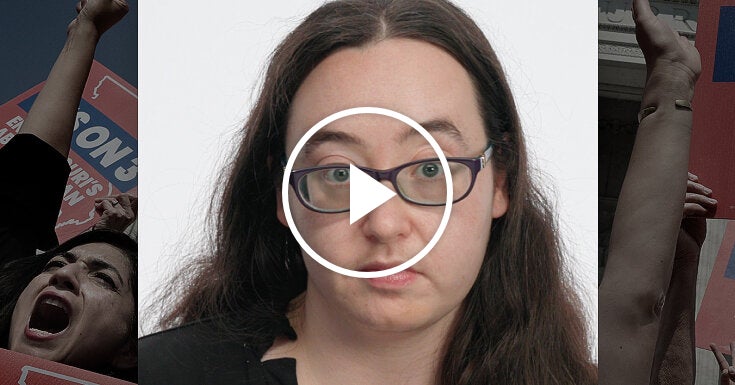
In the first presidential election since the Supreme Court overturned Roe v. Wade, Vice President Kamala Harris and former President Donald J. Trump bring sharply different records on abortion. Maggie Astor, a political reporter for The New York Times, describes where the candidates stand on the issue.
Politics
Starmer and Streeting invite ‘entire nation’ to contribute to consultation on reforming NHS – UK politics live | Politics

Starmer and Streeting invite ‘entire nation’ to contribute to consultation on reforming NHS
Good morning. When the Labour government came into power, Wes Streeting, the health secretary, declared on his first day in office “the policy of this department is that the NHS is broken”. The government is going to published a 10-year health plan to fix it, and it is due to be published next spring.
Streeting has said the plan will involve three main elements: moving from analogue to digital; more focus on primary care, not hospital care; and more focus on prevention. Keir Starmer explained them in a speech on the NHS in September.
But today the government asking people who work in the NHS and use it – the “entire nation”, as the Department of Health and Social Care puts it in its news release – to contribute to a consultation how health service should change. The DHSC explains:
Members of the public, as well as NHS staff and experts will be invited to share their experiences views and ideas for fixing the NHS via the online platform, change.nhs.uk, which will be live until the start of next year, and available via the NHS App.
The public engagement exercise will help shape the government’s 10 Year Health Plan which will be published in spring 2025 and will be underlined by three big shifts in healthcare – hospital to community, analogue to digital, and sickness to prevention …
Bold ambitions for the NHS can only be achieved by listening to the expertise and knowledge of its 1.54 million strong workforce. Their understanding of what’s holding them back from performing at their best will help us bring down waiting times and provide the world class care the public deserve.
The government has already taken immediate action to address challenges in the health service and deliver an NHS fit for the future. Whether that’s agreeing a deal with resident doctors within weeks, securing a funding increase for GP practices to manage rising pressures or hiring an extra 1,000 GPs into the NHS by the end of this year, there are both short- and long-term reforms working hand in hand.
Streeting has posted a link to the online consultation page on social media.
Our NHS is broken, but not beaten.
We want your help to fix it.
Today the Prime Minister and I are launching the biggest consultation in NHS history! Calling all patients, staff and partners – share your views and experiences for our 10 Year Plan 👇🏻https://t.co/KO12G6CK4d pic.twitter.com/YhB7XaXHLm
— Wes Streeting MP (@wesstreeting) October 21, 2024
Governments launch consultations for various reasons. Clearly, when ministers are making big changes to large, important institutions, it makes sense to find out first what the public think, and occasionally these exercise throw up ideas overlooked by the thinktank, policy-making world. But that is not the only, or even the main, function of these initiatives like this. Ensuring people feel consulted can be just as important as finding out what they think.
More importantly, this is also about pitch-rolling – persuading people that an issue matters, and that change is needed. The public don’t need to be told that the NHS needs rescuing; it is regularly at or near the top of problems that people say matter to them most, according to polling. But we are less than two weeks away from a budget that is set to raise the tax burden by a record amount in cash terms (not necessarily as a proportion of GDP) and it is very, very important for the government to convince people that this is happening for reason (like fixing the broken NHS) and not just out of profligacy. Gordon Brown was the master of this; when he put up national insurance to raise money for the NHS, it turned out to be one of the most popular tax rises ever. Today’s NHS consultation is probably more about budget framing than about a scramble for ideas to pad out next year’s 10-year plan.
Here is the agenda for the day.
Morning: Keir Starmer and Wes Streeting, the health secretary, are visiting a health centre in London to launch their public consultation on the NHS’s future.
11.30am: Downing Street holds a lobby briefing.
2.20pm: Yvette Cooper, the home secretary, takes questions in the Commons.
After 3.30pm: Angela Rayner, the deputy prime minister and housing secretary, opens the Commons debate on the second reading of the employment rights bill.
If you want to contact me, please post a message below the line (BTL) or message me on social media. I can’t read all the messages BTL, but if you put “Andrew” in a message aimed at me, I am more likely to see it because I search for posts containing that word.
If you want to flag something up urgently, it is best to use social media. I’m still using X and I’ll see something addressed to @AndrewSparrow very quickly. I’m also trying Bluesky (@andrewsparrowgdn) and Threads (@andrewsparrowtheguardian).
I find it very helpful when readers point out mistakes, even minor typos (no error is too small to correct). And I find your questions very interesting too. I can’t promise to reply to them all, but I will try to reply to as many as I can, either BTL or sometimes in the blog.
Key events
Here are social media posts from two journalists about the plan for digital “patient passports” in the NHS.
From John Burn-Murdoch, the Financial Times’ chief data reporter
Everyone saying “no we can’t let the NHS use a proper joined up digital patient database, it’s all part of a plot to privatise British healthcare and sell your data” should be forced to read the dozens (hundreds?) of case studies like these
Everyone saying “no we can’t let the NHS use a proper joined up digital patient database, it’s all part of a plot to privatise British healthcare and sell your data” should be forced to read the dozens (hundreds?) of case studies like these https://t.co/8VvouoDGY3 pic.twitter.com/qpJEXQaRaG
— John Burn-Murdoch (@jburnmurdoch) October 21, 2024
From Jim Waterson, the former Guardian journalist who now writes the London Centric newsletter on Substack
I hate doing personal posts but: When my mum was dying last year, NHS data sharing failures and prioritising GDPR over pain relief repeatedly left her in agony. In desperation I began to build a Google Doc of her records linked to a QR code for doctors to scan. System’s broken.
Acting Alba party leader says no decision yet taken over whether Sturgeon will be invited to Salmond’s memorial service

Severin Carrell
Claims that Nicola Sturgeon has been banned from attending Alex Salmond’s memorial service have been rejected as “premature” by Kenny MacAskill, the acting leader of Alba, the former first minister’s nationalist party.
The Sunday Mail reported at the weekend an Alba source saying there was “not a chance in hell” that Sturgeon would be invited, given the pair’s incendiary split over the allegations of sexual misconduct against Salmond.
Sturgeon and Salmond have not spoken since the allegations emerged following a Scottish government inquiry in 2018. Salmond had repeatedly accused her aides of orchestrating a smear campaign against him – claims Sturgeon has consistently dismissed.
In a statement rejecting the Sunday Mail’s claims, MacAskill said:
Now is the time for Alex’s family to be given the privacy and time to grieve the loss of a beloved husband, brother and uncle.
An announcement will be made in the coming days about arrangements for a private funeral to be attended by his family and close friends.
There will be time in the coming weeks to celebrate his life and commemorate his achievements in a memorial service, the family have yet to make any arrangements for that. All other speculation is premature.
Salmond’s family are expecting to hold a private funeral for the former first minister in his home village of Strichen, Aberdeenshire, next week, where he will also be buried. No date has yet been fixed for a memorial service, though some allies have suggested St Andrew’s Day on 30 November.
It remains unclear whether Sturgeon would expect to be invited. Salmond told a BBC Scotland documentary which aired last month: “It’s a big regret that Nicola and I are no longer on speaking terms and I seriously doubt if it’s going to improve.”
Health minister plays down privacy fears about digital ‘patient passports’, saying it’ll be like ‘online banking’
Stephen Kinnock, the care minister, was giving interviews this morning on behalf of the government. He was promoting the consultation on the future of the NHS, but many of the questions he took were about the government’s plans for a digital “patient passport”, ensuring people’s medical records are all available in one place, through the NHS app. Pippa Crerar and Denis Campbell explain that here.
Kinnock sought to play down concerns that people’s data would be at risk. But, in an interview with Mishal Husain on the Today programme, he was could not give her firm assurances on this point.
When Husain asked if people’s patient records would be available to all 1.5 million NHS employees under the government’s plans, Kinnock said the protocols would be set out in the forthcoming data bill. He went on:
We’re absolutely committed to protecting data, and we need the cyber security in place. Of course, one of the problems is the NHS uses Excel XP which is not conducive to the most modern cyber security techniques. We’ve got to modernize the tech.
Husain said protecting data from cyber attacks was a diferent matter, and she again asked if all NHS employees would be able to access someone’s medical records. Kinnock replied:
What we’re proposing is no different to online banking apps. So this is definitely more NatWest than it is Star Trek. This is a system that is going to be based on common sense, on enabling a single patient record.
In the end, if we don’t modernise the NHS, make it more efficient and productive, you can have the best data protection rules in the world, but you not going to have a health and care system that actually works.
Husain tried twice more to get a clear answer about the restrictions on NHS staff accessing individuals’ records. Kinnock did not say in detail how the system would work, but he said ultimately it was a matter of balance.
You’ve got to have a system that works and that enables the hugely important interface between GPS, hospitals and patients, and to create that single patient record.
That has to be balanced against water tight data protection, and that is the balance that we’re going to strike.
But if you constantly just say, we can’t do this because of data protection concerns, you’re just going to have the status quo going on and on and on, and you’re going to have a system that doesn’t work.
Michael Gove says personal attacks on ex-wife Sarah Vine ‘hurt so much’
Michael Gove has said that the most hurtful part of his political career was the attacks on his former wife, Sarah Vine, Peter Walker reports.
Starmer and Streeting invite ‘entire nation’ to contribute to consultation on reforming NHS
Good morning. When the Labour government came into power, Wes Streeting, the health secretary, declared on his first day in office “the policy of this department is that the NHS is broken”. The government is going to published a 10-year health plan to fix it, and it is due to be published next spring.
Streeting has said the plan will involve three main elements: moving from analogue to digital; more focus on primary care, not hospital care; and more focus on prevention. Keir Starmer explained them in a speech on the NHS in September.
But today the government asking people who work in the NHS and use it – the “entire nation”, as the Department of Health and Social Care puts it in its news release – to contribute to a consultation how health service should change. The DHSC explains:
Members of the public, as well as NHS staff and experts will be invited to share their experiences views and ideas for fixing the NHS via the online platform, change.nhs.uk, which will be live until the start of next year, and available via the NHS App.
The public engagement exercise will help shape the government’s 10 Year Health Plan which will be published in spring 2025 and will be underlined by three big shifts in healthcare – hospital to community, analogue to digital, and sickness to prevention …
Bold ambitions for the NHS can only be achieved by listening to the expertise and knowledge of its 1.54 million strong workforce. Their understanding of what’s holding them back from performing at their best will help us bring down waiting times and provide the world class care the public deserve.
The government has already taken immediate action to address challenges in the health service and deliver an NHS fit for the future. Whether that’s agreeing a deal with resident doctors within weeks, securing a funding increase for GP practices to manage rising pressures or hiring an extra 1,000 GPs into the NHS by the end of this year, there are both short- and long-term reforms working hand in hand.
Streeting has posted a link to the online consultation page on social media.
Our NHS is broken, but not beaten.
We want your help to fix it. Today the Prime Minister and I are launching the biggest consultation in NHS history!
Calling all patients, staff and partners – share your views and experiences for our 10 Year Plan 👇🏻https://t.co/KO12G6CK4d pic.twitter.com/YhB7XaXHLm
— Wes Streeting MP (@wesstreeting) October 21, 2024
Governments launch consultations for various reasons. Clearly, when ministers are making big changes to large, important institutions, it makes sense to find out first what the public think, and occasionally these exercise throw up ideas overlooked by the thinktank, policy-making world. But that is not the only, or even the main, function of these initiatives like this. Ensuring people feel consulted can be just as important as finding out what they think.
More importantly, this is also about pitch-rolling – persuading people that an issue matters, and that change is needed. The public don’t need to be told that the NHS needs rescuing; it is regularly at or near the top of problems that people say matter to them most, according to polling. But we are less than two weeks away from a budget that is set to raise the tax burden by a record amount in cash terms (not necessarily as a proportion of GDP) and it is very, very important for the government to convince people that this is happening for reason (like fixing the broken NHS) and not just out of profligacy. Gordon Brown was the master of this; when he put up national insurance to raise money for the NHS, it turned out to be one of the most popular tax rises ever. Today’s NHS consultation is probably more about budget framing than about a scramble for ideas to pad out next year’s 10-year plan.
Here is the agenda for the day.
Morning: Keir Starmer and Wes Streeting, the health secretary, are visiting a health centre in London to launch their public consultation on the NHS’s future.
11.30am: Downing Street holds a lobby briefing.
2.20pm: Yvette Cooper, the home secretary, takes questions in the Commons.
After 3.30pm: Angela Rayner, the deputy prime minister and housing secretary, opens the Commons debate on the second reading of the employment rights bill.
If you want to contact me, please post a message below the line (BTL) or message me on social media. I can’t read all the messages BTL, but if you put “Andrew” in a message aimed at me, I am more likely to see it because I search for posts containing that word.
If you want to flag something up urgently, it is best to use social media. I’m still using X and I’ll see something addressed to @AndrewSparrow very quickly. I’m also trying Bluesky (@andrewsparrowgdn) and Threads (@andrewsparrowtheguardian).
I find it very helpful when readers point out mistakes, even minor typos (no error is too small to correct). And I find your questions very interesting too. I can’t promise to reply to them all, but I will try to reply to as many as I can, either BTL or sometimes in the blog.
Politics
Jenrick accuses Badenoch of being ‘disrepectul’ to Tory members
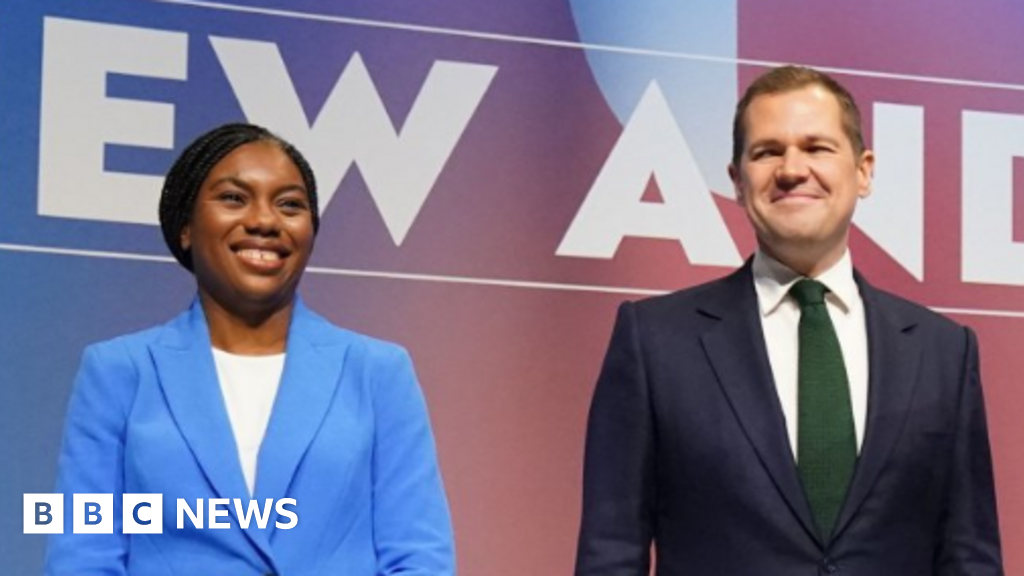
Conservative leadership contender Robert Jenrick has attacked his rival, Kemi Badenoch, accusing her of being “disrespectful” to Tory members by failing to set out policies.
The pair are in the final stretches of a campaign to replace Rishi Sunak, who led his party to an historic defeat at the general election in July.
Jenrick, who trailed Badenoch for support in the last voting round of MPs, has previously signed up to the yellow card penalty system introduced at the start of the contest and intended to stop “blue-on-blue” infighting.
He has put policy on immigration – and a commitment to leaving the European Court of Human Rights (ECHR) – at the heart of his campaign, whereas Badenoch has accused Jenrick of offering “easy answers” on the issue.
Conservative Party members are currently taking part in an online vote after the field was whittled down to two in a series of votes by MPs.
The vote ends on 31 October, with the victor to be announced two days later on 2 November.
Jenrick said Badenoch needed to set out her stance on “the big issues facing our country”, including whether the UK should remain a member of the ECHR.
He told BBC Radio 4’s Westminster Hour: “I think it’s disrespectful to the members and the public to ask for their votes without saying where you stand on the big issues facing our country today.
“A plan today is what I offer. A promise of a plan at some point in the future is what my opponent offers, and I don’t think that’s the way to rebuild the public’s trust and confidence in us.”
He insisted that all Conservatives who wanted to stand as a candidate at the next election would have to sign up to leaving the European Convention on Human Rights (ECHR) if he became their leader.
Badenoch has not ruled out leaving the ECHR, but has repeatedly said there needs to be a bigger plan and not just “a throwaway promise to win a leadership election.”
Her pitch is that the party needs to return to “first principles” and be clear about what it stands for, rather than “throwing out numbers” and “easy answers” or setting out new policy promises or targets that may not be kept.
The duo have two more weeks to make their case to the Conservative members before Sunak’s successor is announced.
The leadership contest has been running since July, when six candidates entered the race, overseen by 1922 committee chair Bob Blackman.
At the time, Blackman said he wold give a yellow card and a public dressing down to any candidate who attacked a rival during the campaign.
He said “constant backbiting and attacking colleagues” by Tory MPs during the last parliament was a key reason “why the party did so badly in the general election”.
Politics
Perth primary schools close as strikes target Swinney constituency
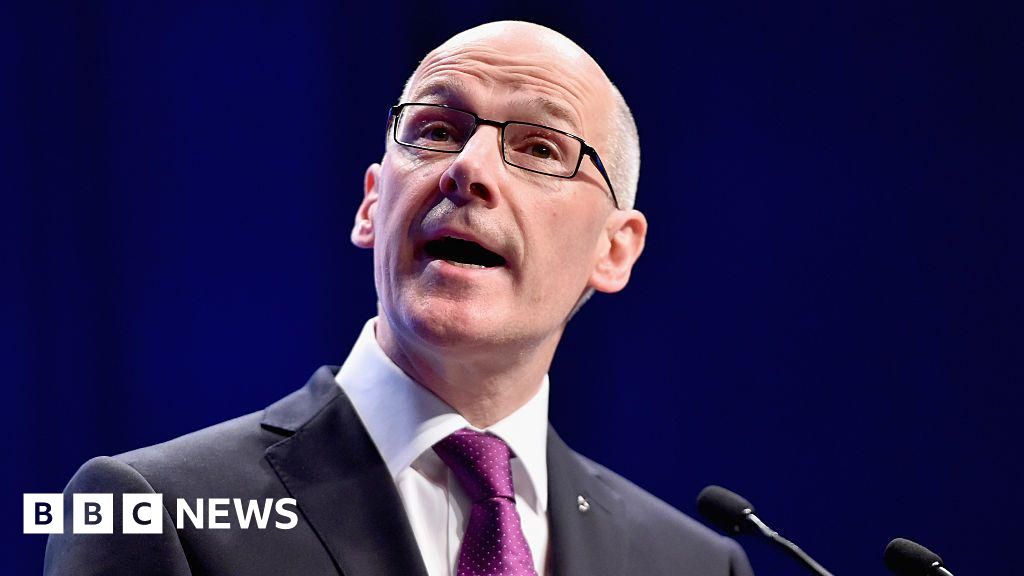
All of the primary schools in Perth and Kinross are closed after non-teaching school staff began strike action in First Minister John Swinney’s constituency.
Members of the union Unison, which includes janitors and classroom assistants, have walked out over pay for all council workers – meaning 50 schools and early years centres will be closed today and could remain closed for two weeks.
The union has targeted the first minister’s constituency with hopes of putting pressure on Mr Swinney.
The latest pay offer – an increase of either 3.6% or £1,292 – was made in August to see off the threat of bin strikes and it was accepted by GMB and Unite but not Unison, the biggest council union.
All secondary schools will be open except St John’s Academy in Perth and the Community School of Auchterarder.
The council said it was not possible to complete risk assessments in advance due to the October holidays, so it had to close all primary schools and early years centres – but the situation will be reviewed daily.
It said the situation could change on a day-to-day basis, and parents and guardians should refer to the council website for updates.
Before and after school care will also be closed and payments will be made to families whose children are eligible for free school meals.
The walkout by Unison members is due to begin immediately after the two-week October school holiday, meaning schools could be shut for a full month
Both the Scottish government and council body Cosla said no more money for pay deals was available this year.
The GMB and Unite wanted their members to get the 3.6% rise they voted for as soon as possible. This would be backdated to April.
However, Unison has warned of a national strike ballot if the dispute is not resolved.
The union believes more needs to be done to address what it sees as the long-term decline in the value of council pay.
It argued that council staff have seen the value of their pay fall by 25% over the last 14 years and said councils have faced problems recruiting staff for some roles.
Speaking to BBC Radio’s Good Morning Scotland programme, Finance Secretary Shona Robison said no one’s interests will be served by the industrial action.
She said: “I’m acutely aware of the impact on children and parents in Perth and Kinross
“I would certainly encourage dialogue to continue between Cosla and Unison, a solution has to be found.
She added: “I have to be clear, the result of this industrial action and all this disruption will not be more money, because there simply is none.”
Councils said using any more of their money for pay would mean further cuts to services or job losses.
Politics
Why are we building homes when so many are standing empty?

 Getty Images
Getty ImagesIn an average working day, Claudia Bowring has to play the role of detective, estate agent, family mediator and, occasionally, grief counsellor.
She’s an empty homes officer for a borough council in the suburbs of Nottingham.
There are just short of 700,000 empty and unfurnished homes in England, according to the most recent government figures. Of those, 261,471 are classed as “long-term empty,” meaning no-one has lived there for six months or more.
If all empty homes were brought back into use, the housing crisis would be solved at a stroke and, arguably, the government would not have to build 1.5m new homes.
Unfortunately, it’s not as simple as that. Bringing derelict and abandoned properties back to life can be a long and complex process.
Even finding out who owns properties that have been standing empty for years, or in some cases decades, can be a challenge.
Ms Bowring regularly uses a genealogist to track down the owners of long-abandoned houses on her patch in Rushcliffe.
They are not always happy to be reminded of their responsibilities.
“In some cases, people don’t really understand the seriousness of their property being empty,” she says.
“They think ‘well, it’s my house, there is nothing the council can say or do to make me change my mind.’”
Often homes become empty when the owners pass away, leading to a long administrative process known as probate, when their assets are divided up.
Once that has been settled, families can still be reluctant to part with a property. Claudia Bowring is facing this problem with one of the houses on her patch.
“The children have grown up there, their mum’s died and left them the house, and emotionally they feel quite attached to the property, and me suggesting they should get rid of it or have it for rental is quite difficult to hear.
“They don’t want to see someone else living in the property. They’ve got trees that they planted in the garden when they were children, and they don’t want someone coming in and ripping those up.”
When persuasion fails, the gloves come off.
Like many local authorities, Conservative-controlled Rushcliffe charges extra council tax on homes that have been unoccupied for more than a year, under the Empty Homes Premium brought in by the previous government.
If that doesn’t do the trick, the council can take enforcement action.
It treats abandoned properties as an environmental health issue – derelict properties can be a magnet for vandalism and vermin, harming the quality of life for people living next to them.
In some cases, the council is able to carry out emergency repair work on abandoned homes, and then force a sale at auction to recover its costs. This sometimes results in a windfall for the owners who were so reluctant to sell up in the first place.
Another tool at the council’s disposal are Empty Dwelling Management Orders, which give councils the right to take over and make repairs to run-down private properties that have been vacant for at least two years. They can rent the property out for up to seven years to recover costs.
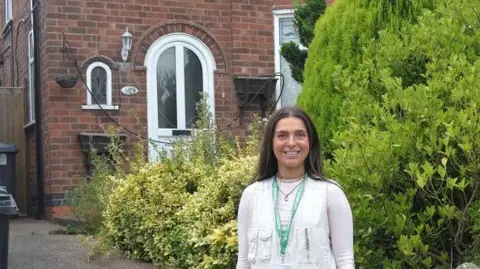
Rushcliffe has used these tools and others to bring a modest but steady flow of properties back into use since it started taking the issue seriously in 2019.
But it does not have to do this. There is no legal requirement for local authorities to bring empty homes back into use – and some councils choose not to.
Rushcliffe is motivated by a desire to improve the quality of life for its residents and ease the housing shortage.
But unlike many councils around the country, it is not in financial trouble – and does not have a serious homelessness problem.
For some hard-pressed authorities “empty homes work is a luxury,” says housing expert Adam Cliff.
“It is not against the law to own an empty property,” he adds, and “different councils have different priorities”.
As secretary of professional support group the Empty Homes Network, he wants to raise the profile of empty homes among the public and politicians, as an alternative to building on the green belt land.
He argues that there needs to be a central government programme, with a “pot of money for councils to dip into as and when they need money to carry out enforcement,” along the lines of a scheme operated by the Welsh government.
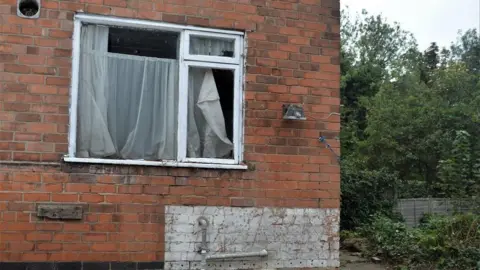
Probate law needs to be reformed to prevent properties “sitting empty in perpetuity,” he adds, but above all he believes empty homes need to be put back in the spotlight as a national issue.
Campaign group Shelter is also concerned about the growing number of privately-owned empty properties, even if its main focus is on getting more social-rented homes built.
Chief executive Polly Neate said: “We desperately need more genuinely affordable social homes and if the government is serious about its commitment to deliver them, it must do more to bring long-term empty homes back into use.
“Converting empty homes is not the silver bullet to ending the housing emergency, but it offers a cost-effective and green way to get more social rent homes built.”
Last year, Shelter produced a 10-city plan to rapidly convert 10,500 empty homes in the first three years of a new government.
But the issue was rarely mentioned during the general election campaign, with only the Green Party putting it in their manifesto.
And so far, there are few signs the Labour government regards it as a priority.
A Ministry of Housing, Communities and Local Government spokesperson said: “Councils have a range of tools at their disposal to bring empty homes back into use, including charging additional council tax on vacant properties.
“We are committed to building 1.5 million homes and delivering the biggest increase in social and affordable housing in a generation. This will unlock thousands of homes and make the dream of homeownership a reality for more people across the country.”
People working with empty homes all seem to have a strong sense of vocation.
Adam Cliff said he first got interested in the issue as a teenager, and wrote his university dissertation on it. Claudia Bowring talks about the satisfaction she gets from putting life back into “dead properties”.
But with little apparent interest from central government, and council budgets being squeezed, they are unlikely to be joined by new colleagues in the field any time soon.
Politics
Michael Gove says personal attacks on ex-wife Sarah Vine hurt most in his career

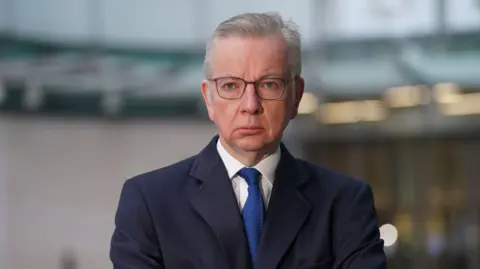 PA
PAFormer Conservative cabinet minister Michael Gove has said critics’ attacks of his ex-wife Sarah Vine was “the thing that really hurt most” during his political career.
Gove said Vine was “portrayed as a sort of Lady Macbeth figure” as he weighed up backing Boris Johnson for Tory leader, following the Brexit vote in 2016.
He said the “fact she was attacked in that way at a time of turmoil overall was incredibly hurtful”.
Gove – who stood down as an MP ahead of June’s general election – opens up about his most difficult moments in politics on his new BBC Radio 4 series.
In Surviving Politics with Michael Gove, the former education secretary speaks candidly with politicians from different parties about the strengths and skills needed in tough times.
For one episode, Gove interviewed Labour spin doctor and former cabinet minister Peter Mandelson.
Now editor of the Spectator magazine, Gove asked Mandelson what advice he would give new Labour MPs who have entered Parliament following this year’s general election.
“Be very clear what you believe in, what your convictions are, what your project is and what you want to achieve,” Mandelson said.
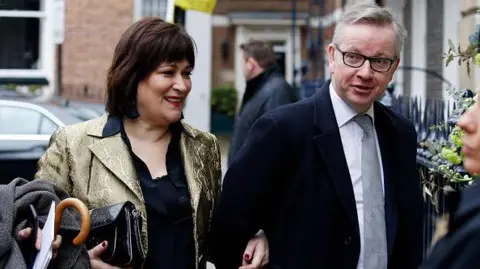 Getty Images
Getty ImagesHe then asked Gove: “All sorts of things have happened to you in the course of your political career. If you had to identify one really personal thing that hurt, what was that?”
Gove recalled how in 2016, Vine accidentally sent a private email – meant to be read by him and his close advisors – to a member of the public, who leaked it to the press.
In the email, Vine had advised her husband to get assurances from Johnson “otherwise you cannot guarantee your support” for his leadership bid.
Two days later, Johnson unexpectedly withdrew, after Gove made a surprise attempt to become leader of the Conservative Party.
Gove said his ex-wife, “whom I still love very much”, was “a strong woman” and disputed the comparison to Lady Macbeth.
Gove said: “It’s always fine if you’re being attacked on ground where you think, yeah, I’m happy to defend myself.
“But when it’s a misunderstanding and a misunderstanding that affects someone close to you, that’s particularly difficult.”
He added: “It’s when people seek to construct a narrative and they draw someone else in and that person is collateral damage in an attack on you. It hurts so much.”
Mandelson said he saw “an echo of that in my own life, with my own partner, now husband, when they went for him and they did”.
In the interview, Mandelson said: “I didn’t even think I could necessarily enter Parliament because I was gay.”
He said he lived openly with his partner and was told by people “you’re going to find it very difficult to be selected.
“And it was a struggle and in the 1987 election, which was the first campaign I directed, I was targeted viciously by the News of the World,” he said.
Mandelson talked about internal Labour divisions and the power struggle between Gordon Brown and Tony Blair as they vied for leadership of the party in the 1990s.
In a conversation about “change-makers” in the current Labour government, Mandelson described Health Secretary Wes Streeting as “courageous”.
Mandelson said: “Courageous and foolhardy? Let’s see I don’t see any point in being in politics unless you’re going to be a minister like that.”
He said “if there are others like Wes Streeting, then I’ll certainly be supporting them”.
You can listen to all episodes of Surviving Politics with Michael Gove from Monday 21 October 2024 on BBC Sounds.
-

 Science & Environment1 month ago
Science & Environment1 month agoHyperelastic gel is one of the stretchiest materials known to science
-

 Technology4 weeks ago
Technology4 weeks agoIs sharing your smartphone PIN part of a healthy relationship?
-

 Science & Environment1 month ago
Science & Environment1 month ago‘Running of the bulls’ festival crowds move like charged particles
-

 Science & Environment1 month ago
Science & Environment1 month agoHow to unsnarl a tangle of threads, according to physics
-

 Science & Environment1 month ago
Science & Environment1 month agoMaxwell’s demon charges quantum batteries inside of a quantum computer
-

 Technology1 month ago
Technology1 month agoWould-be reality TV contestants ‘not looking real’
-

 Science & Environment4 weeks ago
Science & Environment4 weeks agoX-rays reveal half-billion-year-old insect ancestor
-

 Science & Environment1 month ago
Science & Environment1 month agoSunlight-trapping device can generate temperatures over 1000°C
-

 Science & Environment1 month ago
Science & Environment1 month agoLiquid crystals could improve quantum communication devices
-

 Science & Environment1 month ago
Science & Environment1 month agoQuantum ‘supersolid’ matter stirred using magnets
-

 Womens Workouts4 weeks ago
Womens Workouts4 weeks ago3 Day Full Body Women’s Dumbbell Only Workout
-

 Science & Environment1 month ago
Science & Environment1 month agoWhy this is a golden age for life to thrive across the universe
-

 Science & Environment1 month ago
Science & Environment1 month agoQuantum forces used to automatically assemble tiny device
-

 Science & Environment1 month ago
Science & Environment1 month agoLaser helps turn an electron into a coil of mass and charge
-

 TV3 weeks ago
TV3 weeks agoসারাদেশে দিনব্যাপী বৃষ্টির পূর্বাভাস; সমুদ্রবন্দরে ৩ নম্বর সংকেত | Weather Today | Jamuna TV
-

 Science & Environment1 month ago
Science & Environment1 month agoNerve fibres in the brain could generate quantum entanglement
-

 Science & Environment1 month ago
Science & Environment1 month agoHow to wrap your mind around the real multiverse
-

 Science & Environment1 month ago
Science & Environment1 month agoA slight curve helps rocks make the biggest splash
-

 Technology3 weeks ago
Technology3 weeks agoUkraine is using AI to manage the removal of Russian landmines
-

 Science & Environment1 month ago
Science & Environment1 month agoA new kind of experiment at the Large Hadron Collider could unravel quantum reality
-

 Science & Environment1 month ago
Science & Environment1 month agoITER: Is the world’s biggest fusion experiment dead after new delay to 2035?
-

 News1 month ago
News1 month ago▶️ Hamas in the West Bank: Rising Support and Deadly Attacks You Might Not Know About
-
Business3 weeks ago
DoJ accuses Donald Trump of ‘private criminal effort’ to overturn 2020 election
-

 Business2 weeks ago
Business2 weeks agoWhen to tip and when not to tip
-
News1 month ago
the pick of new debut fiction
-

 Science & Environment1 month ago
Science & Environment1 month agoTime travel sci-fi novel is a rip-roaringly good thought experiment
-

 News1 month ago
News1 month ago▶️ Media Bias: How They Spin Attack on Hezbollah and Ignore the Reality
-

 Science & Environment1 month ago
Science & Environment1 month agoNuclear fusion experiment overcomes two key operating hurdles
-

 News4 weeks ago
News4 weeks agoOur millionaire neighbour blocks us from using public footpath & screams at us in street.. it’s like living in a WARZONE – WordupNews
-

 Technology4 weeks ago
Technology4 weeks agoWhy Machines Learn: A clever primer makes sense of what makes AI possible
-

 News2 weeks ago
News2 weeks agoMassive blasts in Beirut after renewed Israeli air strikes
-

 News2 weeks ago
News2 weeks agoNavigating the News Void: Opportunities for Revitalization
-

 Technology3 weeks ago
Technology3 weeks agoMicrophone made of atom-thick graphene could be used in smartphones
-

 MMA3 weeks ago
MMA3 weeks agoJulianna Peña trashes Raquel Pennington’s behavior as champ
-

 Technology2 weeks ago
Technology2 weeks agoSamsung Passkeys will work with Samsung’s smart home devices
-

 News2 weeks ago
News2 weeks ago▶ Hamas Spent $1B on Tunnels Instead of Investing in a Future for Gaza’s People
-

 Science & Environment1 month ago
Science & Environment1 month agoPhysicists have worked out how to melt any material
-

 Science & Environment1 month ago
Science & Environment1 month agoPhysicists are grappling with their own reproducibility crisis
-

 Sport3 weeks ago
Sport3 weeks agoWorld’s sexiest referee Claudia Romani shows off incredible figure in animal print bikini on South Beach
-

 Technology3 weeks ago
Technology3 weeks agoThis AI video generator can melt, crush, blow up, or turn anything into cake
-

 Football3 weeks ago
Football3 weeks agoRangers & Celtic ready for first SWPL derby showdown
-

 News2 weeks ago
News2 weeks agoHeavy strikes shake Beirut as Israel expands Lebanon campaign
-

 TV2 weeks ago
TV2 weeks agoLove Island star sparks feud rumours as one Islander is missing from glam girls’ night
-

 Sport2 weeks ago
Sport2 weeks agoCoco Gauff stages superb comeback to reach China Open final
-

 Sport2 weeks ago
Sport2 weeks agoWales fall to second loss of WXV against Italy
-

 MMA3 weeks ago
MMA3 weeks agoPereira vs. Rountree prediction: Champ chases legend status
-

 Sport3 weeks ago
Sport3 weeks agoBoxing: World champion Nick Ball set for Liverpool homecoming against Ronny Rios
-

 MMA3 weeks ago
MMA3 weeks agoDana White’s Contender Series 74 recap, analysis, winner grades
-

 TV3 weeks ago
TV3 weeks agoPhillip Schofield accidentally sets his camp on FIRE after using emergency radio to Channel 5 crew
-

 News3 weeks ago
News3 weeks agoHeartbreaking end to search as body of influencer, 27, found after yacht party shipwreck on ‘Devil’s Throat’ coastline
-

 Sport3 weeks ago
Sport3 weeks agoSturm Graz: How Austrians ended Red Bull’s title dominance
-

 MMA2 weeks ago
MMA2 weeks ago‘Uncrowned queen’ Kayla Harrison tastes blood, wants UFC title run
-
Business3 weeks ago
Eurosceptic Andrej Babiš eyes return to power in Czech Republic
-

 News1 month ago
News1 month agoYou’re a Hypocrite, And So Am I
-

 Sport1 month ago
Sport1 month agoJoshua vs Dubois: Chris Eubank Jr says ‘AJ’ could beat Tyson Fury and any other heavyweight in the world
-

 Technology4 weeks ago
Technology4 weeks agoMeta has a major opportunity to win the AI hardware race
-

 Technology3 weeks ago
Technology3 weeks agoMusk faces SEC questions over X takeover
-

 News3 weeks ago
News3 weeks agoGerman Car Company Declares Bankruptcy – 200 Employees Lose Their Jobs
-

 Technology2 weeks ago
Technology2 weeks agoTexas is suing TikTok for allegedly violating its new child privacy law
-

 TV2 weeks ago
TV2 weeks agoMaayavi (මායාවී) | Episode 23 | 02nd October 2024 | Sirasa TV
-

 Money2 weeks ago
Money2 weeks agoWhy thousands of pensioners WON’T see State Pension rise by full £460 next year
-

 MMA2 weeks ago
MMA2 weeks agoPereira vs. Rountree preview show live stream
-
Business3 weeks ago
Bank of England warns of ‘future stress’ from hedge fund bets against US Treasuries
-

 Technology3 weeks ago
Technology3 weeks agoAmazon’s Ring just doubled the price of its alarm monitoring service for grandfathered customers
-

 Technology2 weeks ago
Technology2 weeks agoPopular financial newsletter claims Roblox enables child sexual abuse
-

 News2 weeks ago
News2 weeks agoHull KR 10-8 Warrington Wolves – Robins reach first Super League Grand Final
-

 News2 weeks ago
News2 weeks agoFamily plans to honor hurricane victim using logs from fallen tree that killed him
-

 Technology2 weeks ago
Technology2 weeks agoA very underrated horror movie sequel is streaming on Max
-

 Science & Environment1 month ago
Science & Environment1 month agoRethinking space and time could let us do away with dark matter
-

 Science & Environment1 month ago
Science & Environment1 month agoCaroline Ellison aims to duck prison sentence for role in FTX collapse
-

 Science & Environment1 month ago
Science & Environment1 month agoA tale of two mysteries: ghostly neutrinos and the proton decay puzzle
-
News1 month ago
The Project Censored Newsletter – May 2024
-

 Technology3 weeks ago
Technology3 weeks agoQuantum computers may work better when they ignore causality
-

 Technology3 weeks ago
Technology3 weeks agoUniversity examiners fail to spot ChatGPT answers in real-world test
-

 Health & fitness1 month ago
Health & fitness1 month agoThe secret to a six pack – and how to keep your washboard abs in 2022
-

 News1 month ago
News1 month agoNew investigation ordered into ‘doorstep murder’ of Alistair Wilson
-

 Technology3 weeks ago
Technology3 weeks agoArtificial flavours released by cooking aim to improve lab-grown meat
-

 Sport3 weeks ago
Sport3 weeks agoWatch UFC star deliver ‘one of the most brutal knockouts ever’ that left opponent laid spark out on the canvas
-

 Technology3 weeks ago
Technology3 weeks agoEpic Games CEO Tim Sweeney renews blast at ‘gatekeeper’ platform owners
-

 Business3 weeks ago
Business3 weeks agoChancellor Rachel Reeves says she needs to raise £20bn. How might she do it?
-

 MMA3 weeks ago
MMA3 weeks agoAlex Pereira faces ‘trap game’ vs. Khalil Rountree
-

 Football3 weeks ago
Football3 weeks agoSimo Valakari: New St Johnstone boss says Scotland special in his heart
-

 News2 weeks ago
News2 weeks agoHungry customer left gobsmacked as two blokes riding giant HORSES stroll into local chip shop
-

 Technology2 weeks ago
Technology2 weeks agoApple iPhone 16 Plus vs Samsung Galaxy S24+
-

 Technology2 weeks ago
Technology2 weeks agoUlefone Armor Pad 4 Ultra is now available, at a discount
-

 News2 weeks ago
News2 weeks agoReach CEO Jim Mullen: If government advertises with us, we’ll employ more reporters
-
Politics3 weeks ago
Rosie Duffield’s savage departure raises difficult questions for Keir Starmer. He’d be foolish to ignore them | Gaby Hinsliff
-

 News2 weeks ago
News2 weeks agoBalancing India and China Is the Challenge for Sri Lanka’s Dissanayake
-

 Technology2 weeks ago
Technology2 weeks agoThe best shows on Max (formerly HBO Max) right now
-

 Sport2 weeks ago
Sport2 weeks agoMan City ask for Premier League season to be DELAYED as Pep Guardiola escalates fixture pile-up row
-
Business3 weeks ago
Sterling slides after Bailey says BoE could be ‘a bit more aggressive’ on rates
-

 News2 weeks ago
News2 weeks ago‘Blacks for Trump’ and Pennsylvania progressives play for undecided voters
-

 News2 weeks ago
News2 weeks agoTrump’s Response To Melania’s Abortion Stance Has Critics Saying Same Damning Thing
-
Business2 weeks ago
Maurice Terzini’s insider guide to Sydney
-

 Money2 weeks ago
Money2 weeks agoWetherspoons issues update on closures – see the full list of five still at risk and 26 gone for good
-

 MMA2 weeks ago
MMA2 weeks agoUFC 307 preview show: Will Alex Pereira’s wild ride continue, or does Khalil Rountree shock the world?
-

 Technology2 weeks ago
Technology2 weeks agoThe best budget robot vacuums for 2024
-
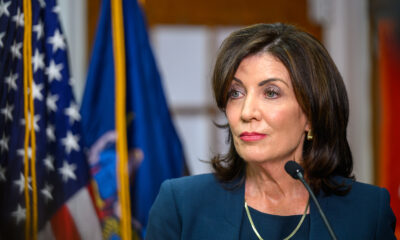
 Politics3 weeks ago
Politics3 weeks agoHochul’s careful conversations
-

 Football1 month ago
Football1 month agoMike Williamson: Carlisle United appoint MK Dons boss as head coach
-
Politics1 month ago
UK consumer confidence falls sharply amid fears of ‘painful’ budget | Economics


You must be logged in to post a comment Login